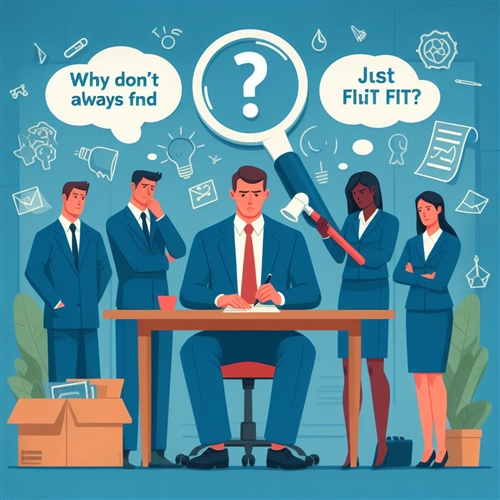


適切な仕事を見つけることは、干し草の山の中から針を探すような気分になることがあります。 強力な履歴書と優れた面接スキルを持っていても、時には適合しないことがあります。しかし、候補者と雇用主の間のこのようなミスマッチの原因は何でしょうか?求人選択が失敗する一般的な理由をいくつか掘り下げてみましょう。
スキルと価値観の不一致
スキルギャップ
求人選択の失敗の根本的な理由の一つは、候補者と仕事の要件の間のスキルギャップです。これはどちらの側にも起こり得ます。雇用主は候補者が持っているスキルを過大評価したり、候補者は役割の複雑さを過小評価したりする可能性があります。
例えば、求人票には「優れたコミュニケーションスキル」が必須条件として記載されているかもしれません。しかし、面接中に候補者が自分の考えを明確に表現するのに苦労する場合、これは認識されているスキルレベルと実際のスキルレベルとの間にギャップがあることを示しています。
価値観の不一致
同様に重要な考慮事項は、企業文化と個人の価値観です。協力的でペースの速い環境で活躍する候補者が、厳格な階層型企業での役割に応募する場合を考えてみましょう。技術的なスキルを持っているかもしれませんが、文化的な適合性の欠如は、両者にとって不満につながる可能性があります。
例えば、ワークライフバランスを重視する企業は、長時間労働や常に忙しく働くことを好む人には合わないかもしれません。
情報が不完全または不正確
非現実的な求人票
求人票は、資格のある候補者を惹きつけるための重要なツールです。しかし、誤解を招く、または過度に装飾された説明は、役割について非現実的なイメージを与える可能性があります。これは、最終的には日常的な業務や責任に適していない候補者が応募することにつながる可能性があります。
例えば、求人票では役割の「ダイナミックでエキサイティングな」性質を強調し、大量の反復的な作業については言及しない場合があります。この期待のミスマッチは、新規採用者の早期の幻滅につながる可能性があります。
不測の事態
時には、どちらかの側で予期せぬ事態が発生し、求人選択が失敗に終わることもあります。候補者が選ばれた後に、企業がリストラや予算削減を経験する可能性があります。逆に、候補者は交渉段階で他の場所でより魅力的なオファーを受ける可能性があります。
これらの状況は不満を引き起こす可能性がありますが、多くの場合避けられません。
徹底的な選考プロセスの重要性
求人選択の失敗の原因を軽減することで、雇用主と候補者の両方が適切な人材を見つける可能性を高めることができます。これには、以下を含む徹底的な選考プロセスが必要です。
明確に定義された求人票:必要なスキル、経験、企業文化の概要を説明します。
深堀りの面接:候補者の能力と文化的な適合性を評価します。
現実的な期待:役割と企業文化について明確な期待を設定します。
包括的な選考プロセスに時間とリソースを投資することで、雇用主と候補者の両方が、成功し、充実したマッチングを見つける可能性を高めることができます。